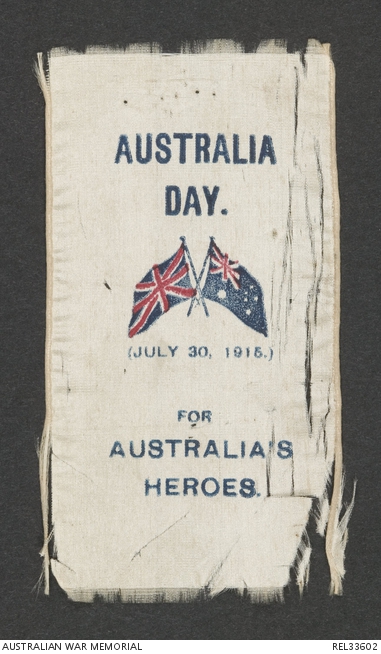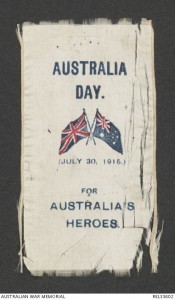In 1818 Governor Lachlan Macquarie acknowledged the thirtieth anniversary of the British occupation of Australia by proclaiming 26 January a public holiday in New South Wales. The day was known as ‘Foundation Day’, and each colony commemorated their founding independently. It was not until 1935 that all states and territories agreed to observe the same national day – Australia Day – on 26 January each year.
In July 1915 ‘Australia Day’ was observed as a national fundraising venture to support wounded soldiers. The concept of such a day was initiated by the mother of four servicemen, Mrs Wharton-Kirke of Manly. In June 1915 she suggested to NSW Premier, Sir Charles Wade, that such a day would draw on the nation’s pride and contribute to a growing sense of national identity. July 30 was subsequently declared as ‘Australia Day’ with a variety fundraising events including auctions, stalls, performances and street collections. £839,500 was raised in New South Wales alone, close to $1.7 million in today’s currency. The success of Australia Day in 1915 saw a repeat of similar national fundraising events for the duration of the war. In recognition of her efforts, the NSW Premier presented Mrs Wharton-Kirke with a gold medalet. It is one of only four commemorative Gallipoli medalets that were struck in solid gold.
Australia Day in Orange in 1915 was celebrated over several days. Events in the week preceding 30 July included a concert and memorial service at the Australian Hall, a social evening and variety entertainment at East Orange Public School, a torchlight procession, a rugby football league benefit match and an Australian fair at the Oddfellows’ Hall. On the day school children joined military and friendly societies and numerous community groups in a huge street procession that terminated outside the Australian Hall. The Mayor then addressed the people of Orange and delivered an appeal. Throughout the day special Australia Day souvenirs and badges were on sale. Other events included a patriotic rifle match, continuous children’s concerts and a presentation of moving picture displays by the Empire Picture Company. Celebrations concluded with the presentation of the Orange Player’s Club drama, The Englishman’s Home.
Australia Day celebrations in Orange in 1915 raised in excess of £10,000 ($20,000). Australia Day Special Fund
For Australia’s Heroes – the other ‘Australia Day’, 30 July 1915


